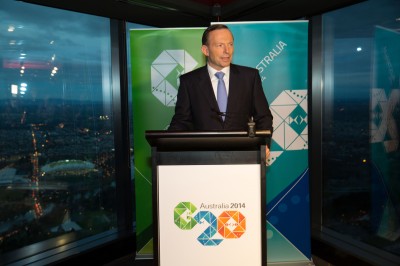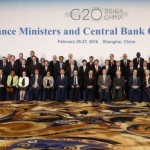When the carnival is over: Australia’s surprising G20 legacy

The genesis of the G20 is a tale of two crises. The first — the Asian financial crisis — led to the creation of the G20 as a meeting of finance ministers and central bank governors from 19 of the world’s largest economies plus the EU. The second — the global financial crisis — led then-US president George W. Bush to elevate the G20 to a leaders’ level meeting. This decision was accompanied by claims that the G20 had replaced the G7 and was now the pre-eminent forum for international economic policy coordination. Those claims have grown more credible over the past five years but they are not entirely unchallenged. Indeed, the chances that the G20 might disintegrate into another more fractious configuration were given an improbable boost from within under Australia’s presidency over the past year.
Bush’s hand in convening the initial G20 leaders’ summit was forced by the dire circumstances in which the global economy found itself in 2008. The work of the early G20 summits largely focused on averting a deeper crisis, as opposed to international institution building. But the creation of the G20 is also the product of longer term trends in the global economy. If Bush had not elevated the G20 to the level of a leaders’ forum in 2008, something similar may well have evolved in the following decade, as the interests of the emerging economic powers needed to be taken into account in the way in which the global economic system had to be run.
The G20 represents 83 per cent of the global economy at purchasing power parity, and 80 per cent of world trade. The Asian G20 members represented 30 per cent of world output and 23 per cent of world trade in 2012. The composition of the G20 itself is a huge improvement on the G7/8. The inclusion of five more Asian economies in the group (Australia, China, India, Indonesia and South Korea), three Latin American economies (Argentina, Brazil and Mexico), as well as Saudi Arabia and Turkey, was a major step forward in covering the interests of the world’s major economies.
These additions, along with South Africa, deliver regional, cultural, political and institutional diversity as well as new economic power to the top table. This diversity and divergence is sometimes seen as a weakness in the structure of the G20. Achieving agreement among a broad group is certainly more difficult, debates more intense, and disagreements out in the open. But in the negotiations that are now necessary to effective global economic policy coordination, it is better to be talking to those with whom reaching some kind of agreement is difficult but important than with those among whom there is agreement to begin with. From this perspective, the comprehensiveness of, and diversity among, the G20 membership is a significant strength not a weakness.
This dimension of the G20 has been sharply tested over the year of the Australian presidency because of the political tension between Russia and Europe and the United States and its allies (including Australia) over Ukraine.
What brought the G20 together was the priority that attached to economic policy coordination. Economic cooperation remains the central and binding rationale of the G20 group. That entails geo-political not purely economic commitment. And a gathering of world leaders cannot avoid the pressing geo-political issues of the day, as was evident at the St Petersburg summit when attention turned naturally to the Syrian problem.
As Bruce Jones points out in this week’s lead, the emerging economies decisively quashed the idea that Australian Prime Minister Tony Abbott and Foreign Minister Julie Bishop had earlier touted the possibility of Russia’s President Putin’s being banned from the Australian summit. ‘The custodianship of the G20 belongs to all Member States equally and no one Member State can unilaterally determine its nature and character’, the BRICS leadership declared, ahead of the Australian leadership’s galloping retreat.
While it may have been understandable that Abbott and Bishop were inclined to ‘stand up’ to Russia, it was hardly a well-considered position. True, in the case of Syria, while the members of the G20 were in proxy competition, they were not in active confrontation. The case of Ukraine, as Jones points out, is different. There the G20 faces a situation where one of its members, Russia, is in active diplomatic, political and legal confrontation with other members — it is an active military participant in a crisis to which the EU and the United States are interested parties and is under sanctions from the West. And Russia’s annexation of Crimea threatened the legal and political foundations of the international order, namely the non-use of force to acquire territory. Yet this is no Munich moment.
What should have been blindingly clear from the beginning to the Australian leadership was that trying to exclude Russia from Brisbane would be very costly indeed — that it was unlikely to be possible without breaking the G20 itself. ‘For the emerging powers, membership of the G20 is not only an important symbol of their rise’, as Jones suggests, ‘it’s a seat at what many of them view as the top decision-making table on international affairs’. What motivated the emerging powers is not support of Russian actions in Ukraine but assertion of the principle that they couldn’t be excluded from international decision-making at the say-so of the West.
‘Russia may well prove to be reasonable within the G20 — after all, they have to worry not just about the West’s reactions but also India’s and China’s, and neither of those countries would take kindly to having Mr Putin turn the G20 into a platform for grandstanding against the West, at the price of loss of progress on the economic front’, Jones concludes.
‘The challenge for Australia’ W Pal Sidhu points out, ‘will be to ensure that the sanctions against Russia, the Ukraine crisis, and other international imbroglios, do not detract from the primary objective of the summit, which is to provide strategic priority for growth, financial rebalancing and emerging economies, investment and infrastructure, and employment and labour mobility’.
Since ‘we may well experience over the course of the next decade a simultaneous financial and security crisis involving the top powers’, Jones says, ‘it may prove useful that there’s precedent for not excluding one of the G20 members because of a political or security crisis’.
Just as a century ago the League of Nations did not survive the disengagement of a then-rising United States of America, the current international system and its key institutions are unlikely to survive disengagement of today’s emerging powers.
But here’s the double irony. Australia, among the other smaller economies, had more to lose from disintegration of the G20 process than most, so in whose interests could it have possibly been acting? And its failure to exclude Russia, and humiliation — a sort of modern Gallipoli in geo-political engagement — may still deliver the substantial legacy of the clear political commitment to the G20 that will be important to its continuing resilience and effectiveness.
Whether that achievement can be matched in embedding a substantial economic agenda beyond the carnival in Brisbane, we shall know in little more than a month.
Author: Peter Drysdale is Editor of the East Asia Forum.
Source: eastasiaforum




























